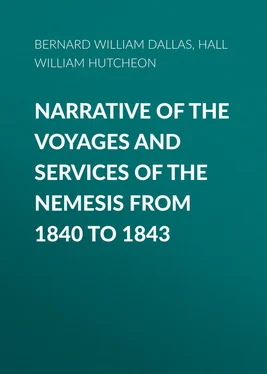William Hall - Narrative of the Voyages and Services of the Nemesis from 1840 to 1843
Здесь есть возможность читать онлайн «William Hall - Narrative of the Voyages and Services of the Nemesis from 1840 to 1843» — ознакомительный отрывок электронной книги совершенно бесплатно, а после прочтения отрывка купить полную версию. В некоторых случаях можно слушать аудио, скачать через торрент в формате fb2 и присутствует краткое содержание. Жанр: foreign_antique, foreign_prose, на английском языке. Описание произведения, (предисловие) а так же отзывы посетителей доступны на портале библиотеки ЛибКат.
- Название:Narrative of the Voyages and Services of the Nemesis from 1840 to 1843
- Автор:
- Жанр:
- Год:неизвестен
- ISBN:нет данных
- Рейтинг книги:5 / 5. Голосов: 1
-
Избранное:Добавить в избранное
- Отзывы:
-
Ваша оценка:
- 100
- 1
- 2
- 3
- 4
- 5
Narrative of the Voyages and Services of the Nemesis from 1840 to 1843: краткое содержание, описание и аннотация
Предлагаем к чтению аннотацию, описание, краткое содержание или предисловие (зависит от того, что написал сам автор книги «Narrative of the Voyages and Services of the Nemesis from 1840 to 1843»). Если вы не нашли необходимую информацию о книге — напишите в комментариях, мы постараемся отыскать её.
Narrative of the Voyages and Services of the Nemesis from 1840 to 1843 — читать онлайн ознакомительный отрывок
Ниже представлен текст книги, разбитый по страницам. Система сохранения места последней прочитанной страницы, позволяет с удобством читать онлайн бесплатно книгу «Narrative of the Voyages and Services of the Nemesis from 1840 to 1843», без необходимости каждый раз заново искать на чём Вы остановились. Поставьте закладку, и сможете в любой момент перейти на страницу, на которой закончили чтение.
Интервал:
Закладка:
The wisdom of the policy of Sir Stamford Raffles, in establishing a free port in such an advantageous position, has been proved beyond all previous anticipation. The perfect freedom of commercial intercourse, without any restriction or charges of any kind, has given birth to a yearly increasing commercial spirit among all the surrounding nations. It is impossible to see the immense number of curious junks and trading-vessels which arrive from all parts during the proper season, without admiring the enterprising commercial spirit of all those different tribes, and acknowledging the immense value to England of similar distant outports, for the security and extension of her commerce.
The intercourse with Singapore has been rapidly increasing every year, but especially since the commencement of the war in China. Of course, all our ships of war and transports touch at so convenient a place, where supplies of every description can easily be obtained, and where every attention and kindness are shewn to strangers, both by the authorities and by the resident merchants. Much credit is due to the late governor, Mr. Bonham, for the intelligence and activity which he exhibited, in everything that could in any way forward the objects of the expedition, and for the readiness with which he endeavoured to meet all the wishes of those who were concerned in it. His hospitality and personal attention was acknowledged by all.
In some respects, Singapore forms a good introduction to a first visit to China. It has a very large Chinese population, (not less than 20,000,) to which yearly additions are made, on the arrival of the large trading junks, in which they come down voluntarily to seek employment. Hundreds of them arrive in the greatest destitution, without even the means of paying the boat-hire to enable them to reach the shore, until they are hired by some masters. They are the principal mechanics and labourers of the town, and also act as household servants, while many of them are employed in the cultivation of spices and of sugar, or in clearing land. There is no kind of labour or employment which a Chinaman will not readily undertake; and they appear to succeed equally well in all, with the exception of tending sheep or cattle, which is an occupation they are little fond of.
The town has something of a Chinese aspect, from the number of Chinamen who are employed in every capacity; and the fruits and vegetables are principally cultivated and brought to market by people of that nation. In Java, Penang, and elsewhere, they are also to be met with in great numbers; which is quite sufficient to prove (were proof wanting) how much they are naturally disposed to become a colonizing people. There is hardly any part of the world to which a Chinaman would refuse to go, if led and managed by some of his own countrymen. But, wherever they go, they carry the vice of opium-smoking with them, and it is needless to say that it thrives at Singapore to its fullest extent, and that a large revenue is annually derived from the monopoly of the sale of the drug.
The climate of Singapore is healthy, although the soil is wet, owing to the constant rains; and the heat is, perhaps, never excessive, although the place is situated only about seventy miles from the equator.
It might be expected that the recent opening of the new Chinese ports, from some of which large trading junks have annually come down to seek their cargoes at Singapore, would prove injurious to the future trade of the latter, since it would no longer be necessary for the Chinese to go abroad to seek for that which will now be brought to them at their own doors. This apprehension, however, seems to be little entertained on the spot, because there can be little doubt, that whatever tends to augment the general foreign trade with China must benefit Singapore, which lies on the highroad to it, to a greater or less extent. Singapore has nothing to fear as regards its future commercial prosperity, which is likely rather to increase than to diminish, in consequence of the general increase of trade with China and the neighbouring islands.
On the 4th of November, the Nemesis resumed her voyage, and passed the little rocky island of Pedra Branca early on the following morning. This dangerous and sometimes half-covered rock lies nearly in the direct track for vessels proceeding up the China Sea; and on its southern side are two dangerous ledges or reefs, running out from it to the distance of more than a mile, which, at high water, can scarcely be traced above the surface. On the opposite, or northern side, there is deep water in not less than sixteen or seventeen fathoms, close in to the rock; and, moreover, the tides in its neighbourhood are very irregular, not only in point of time, but also in direction and velocity. Nor are these the only dangers to be met with in this locality. Hence it will readily appear that a lighthouse placed upon Pedra Branca would be of essential utility to all navigators who have occasion to pass up or down the China Sea. A ship leaving Singapore for Hong-Kong, for instance, might then start at such an hour in the evening as would enable her to make the light on Pedra Branca before morning; by which means, her true position being ascertained, she might stand on without fear of any danger. The expense of erecting the lighthouse would not be great, as the elevation would only be moderate, and the expense of maintaining it might be defrayed by levying a small light-duty at Singapore upon all vessels passing up or down the China Sea.
It has been often suggested that this would be a most advantageous site for the proposed monument to the memory of the distinguished Horsburgh, to whom too much honour cannot be paid for his inestimable works, so much relied on by all navigators who frequent the eastern seas. It would be difficult to find a more advantageous or appropriate position, for the best of all monuments to his fame, than this little, dangerous island of Pedra Branca, situated as it is in the very centre of some of his most valued researches; while the recent opening of the new ports in China, and the possession of Hong-Kong, give an increased importance to subjects connected with the navigation of those seas. There is not a single vessel, either British or foreign, which traverses those regions, which is not indebted to Horsburgh for the instructions which render her voyage secure; and a lighthouse upon Pedra Branca would do no less service to navigators than it would honour to the memory of Horsburgh.
The Nemesis had now passed this rocky little island, and at once found the full strength of the north-east monsoon blowing steadily against her, so that "full steam" was necessary to enable her to proceed. On the afternoon of the 16th, the high land of the Spanish possessions of Luconia (better known by the name of the capital town, Manilla) came in sight; and, on the following morning, the Nemesis passed very near the port, but without venturing to enter it, on account of the delay which it would cause, although fuel was already much wanted.
The appearance of the island was very striking. Bold, picturesque mountains, fine woods, with here and there a few sugar plantations extending along the valleys, and rich, green, cocoa-nut groves, to vary the prospect – all these combined, or alternating with each other, made the aspect of the island very attractive.
Unfortunately, no time could be spared to visit the interior of the country, as the voyage had already been much protracted, and the north-east monsoon was blowing directly against the vessel. Her progress was therefore slow, and the want of fuel began to be much felt.
On the 24th, the Lieu-chew Islands came in sight; but these are not the same islands which were visited by Capt. Basil Hall, whose descriptions excited so much attention. 12
At daylight on the following morning, the 25th of November, the Nemesis steamed through the Typa anchorage, which lies opposite Macao, and ran close in to the town, where the water is so shallow that none but trading-boats can venture so far. The sudden appearance of so large and mysterious-looking a vessel naturally excited the greatest astonishment among all classes, both of the Portuguese and Chinese residents. The saluting of the Portuguese flag, as she passed, sufficed to announce that something unusual had happened; and crowds of people came down to the Praya Grande, or Esplanade, to look at the first iron steamer which had ever anchored in their quiet little bay. Her very light draught of water seemed to them quite incompatible with her size; and even the Portuguese governor was so much taken by surprise, that he sent off a messenger expressly to the vessel, to warn her captain of the supposed danger which he ran by venturing so close in shore. It is probable, however, that his excellency was not quite satisfied with the near approach of an armed steamer, within a short range of his own palace; and, moreover, the firing of a salute, almost close under his windows, had speedily frightened away the fair ladies who had been observed crowding at all the windows with eager curiosity.
Читать дальшеИнтервал:
Закладка:
Похожие книги на «Narrative of the Voyages and Services of the Nemesis from 1840 to 1843»
Представляем Вашему вниманию похожие книги на «Narrative of the Voyages and Services of the Nemesis from 1840 to 1843» списком для выбора. Мы отобрали схожую по названию и смыслу литературу в надежде предоставить читателям больше вариантов отыскать новые, интересные, ещё непрочитанные произведения.
Обсуждение, отзывы о книге «Narrative of the Voyages and Services of the Nemesis from 1840 to 1843» и просто собственные мнения читателей. Оставьте ваши комментарии, напишите, что Вы думаете о произведении, его смысле или главных героях. Укажите что конкретно понравилось, а что нет, и почему Вы так считаете.












